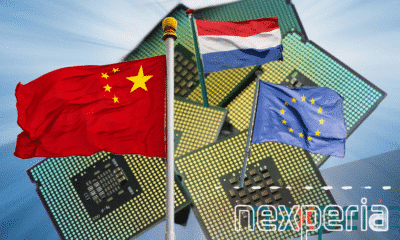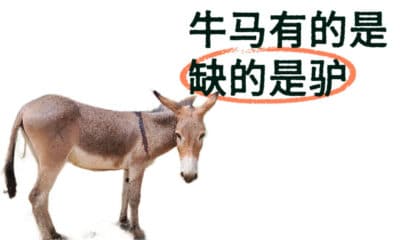China Insight
The Story of Li Jun & Liang Liang: How the Challenges of an Ordinary Chinese Couple Captivated China’s Internet
“Liang Liang and Li Jun are just the tip of the iceberg; there are thousands of couples facing similar challenges.”
Published
2 years agoon

Two years after they first started sharing their story on Chinese social media, millions of netizens are engrossed in the struggles of the Chinese young parents Li Jun and Liang Liang, whose journey of starting a family and buying an apartment in the city at a time of economic downturn turned into an emotional rollercoaster.
The struggles faced by an ordinary young Chinese couple have recently become a major topic on Chinese social media.
For some, their story has unfolded like a compelling movie, “starring Li Jun and Liang Liang.” Others think they could be protagonists in a novel, perhaps one written by Victor Hugo or Lao She.
Here, we explain their story thus far and why it has become such a big topic of discussion on Chinese social media.
A PROMISING FUTURE
“Among tens and thousands of lights in the city, finally there’s a light that only shines for me.”

In 2022, the couple, Zhang Yiliang (张艺亮, the husband, also called ‘Liang Liang’) and Dong Lijun (董丽君, the wife, referred to as Li Jun), first became popular on Chinese social media as they shared their journey of buying a property and building a life in Zhengzhou, Henan Province, on their account ‘The Couple Liang Liang & Li Jun’ (亮亮丽君夫妇).
Their first social media post had appeared in November of 2021. In this video, they shared their excitement about buying an apartment and starting their new life as home owners.
They previously put a deposit on an off-planned apartment, eagerly anticipating its delivery in 2024. They regularly updated their progress on Douyin, showcasing their savings efforts and monthly visits to the construction site. “Among tens and thousands of lights in the city, finally there’s a light that only shines for me,” they said (“从此万家灯火,终有一盏只为我而亮”).
The couple took out a mortgage amount of 1.02 million RMB ($143.660) for the Zhengzhou apartment, which had a total floor area of 1,055 sqft / 98 sqm. They made a downpayment of 450k RMB ($63.370), and agreed to a monthly – relatively high-interest rate – payment of 6293 RMB ($886), while also paying the monthly rent for their apartment (1500 RMB/$211). This meant the budget for other expenses was very tight already, since the couple had an approximate monthly combined income of only 9000 RMB ($1267).
They mainly paid for the downpayment with money that Liang Liang had been saving over the past five years, along with monetary gifts from their wedding and some support from their parents. In order to generate some extra income, Liang also became a taxi driver (Didi) at night.
As the couple gained more popularity online, mainly on Douyin and Bilibili, some Chinese media outlets also began taking notice. In July of 2022, Sanlian Life Weekly (三联生活周刊) featured an interview with the couple, bringing their story to the attention of a wider audience.
THE SPARK IS GONE
“This is our life now, the life of mortgage slaves.”
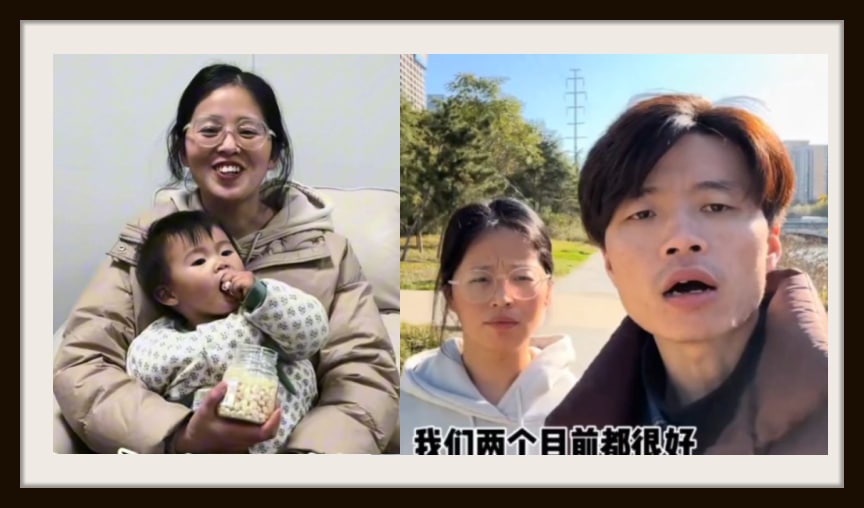
However, things did not go as planned. Months into the construction process, the developer, Sunac China Holdings Limited (融创中国), encountered financial difficulties. In May of 2022, Sunac made headlines as it didn’t meet its payment obligations on a dollar bond, making it one of the major Chinese property companies failing to fulfill its financial commitments.
Li Jun and Liang went to check on how the construction was going every month, and found that Sunac’s financial woes were causing a standstill in construction. Their apartment was located on the 22nd floor of a 33-story-building, but the construction was suspended from the 13th floor up.
Their daughter was also born during this tumultuous time, in October 2022, adding to the financial strain of rent and mortgage payments without a clear move-in date. “This is our life now, the life of mortgage slaves,” they said in one of their videos.

Adding to their challenges, Li Jun experienced a pay cut, reducing their monthly income by 2000 RMB ($282). With the cut leaving them with insufficient funds for essential expenses, they resorted to using their credit card.
In later Douyin videos, fans noticed how frustrated and disillusioned the couple now looked. Some made comparisons to their earlier videos, concluding that the “spark” they previously had in their eyes was gone.
Li Jun and Liang Liang feared that their house might join the ranks of millions of homes in China categorized as “烂尾楼” (làn wěi lóu), referring to ‘rotting’ unfinished buildings. In such cases, apartments that have been sold are abandoned and are not delivered due to financial struggles or other challenges faced by the developers.
After the pay cut they desperately needed more money to get by. They started doing some e-commerce on Douyin and tried to get the rebate that was promised to them when purchasing their apartment-the initial contract included a 20,000 RMB ($2775) special rebate for buyers, which they qualified for.
But no matter how many times they went back and forth to the sales center, the couple faced rejection and insults when demanding their payment. Desperate, Li Jun and Liang Liang turned to their social media fans and livestream followers to put more pressure on the company, but the staff just shut down the lights, closed the doors, and refused to pay them the money that was promised to them.
SILENCED ON SOCIAL MEDIA
“Instead of pursuing justice, I’d rather have a peaceful life.”

In November 2023, the story of Li Jun and Liang Liang gained prominence as they shared dramatic details of their struggles to retrieve their money. On November 15, the couple claimed to have been physically assaulted by staff members of the sales center while demanding their money. Liang ended up in the hospital with minor injuries, and Li, attempting to record the incident, had her phone snatched and the livestream was cut off.
The couple later posted a video later explaining what happened, but that video was soon taken down. Strange things kept happening, and people suspected the couple might have been threatened and bribed.
Because two days later, Li Jun and Liang Liang suddenly shared that the police were now involved, stating that “everything was sorted” and that they were content with the solution provided. This claim of police involvement was confirmed on November 19 by local authorities, who announced penalties for those responsible for beating the couple.
Yet, the last video they posted suddenly became unavailable, and their Douyin account was blocked from updating. Additionally, their other social media accounts on Weibo and Bilibili were both banned from posting (@亮亮和丽君夫妇).
Li Jun still had her personal social media account, revealing on November 22 that the couple had chosen to return to their hometown with their daughter. Liang expressed his desire for justice, but Li Jun emphasized, “But now we have our daughter. I’d rather have a peaceful life.” (#亮亮丽君决定离开郑州回老家#)

One of the social media digital artworks dedicated to Li Jun and Liang Liang. By @泥巴-lau
The idea that Li Jun and Liang Liang felt defeated enough to (temporarily) give up their dream of building their life in the city saddened and angered many netizens, and their story went viral.
But through all their trials and tribulations, the story of Li Jun and Liang Liang may not conclude with an unhappy ending after all.
Their Zhengzhou apartment is apparently not destined to remain an ‘unfinished building’ — the government has intervened to ensure the delivery of the building. In November of 2023, news also came out that Sunac had met conditions for a long-awaited debt restructuring deal, reportedly reducing its total debt by $4.5 billion. The construction of the building has resumed.
In late November, the story of Li Jun and Liang took another unexpected turn when a new video surfaced, suggesting that the couple – despite saying they would relocate to their rural hometown – would give it another shot in Zhengzhou by starting their own business.
Many online users found this twist confusing, suspecting that local authorities might have intervened to reshape the couple’s narrative, possibly to ensure a positive outcome in the public eye (#亮亮丽君决定在郑州创业#).
“Perhaps I should become an internet sensation too,” one commenter responded. “Maybe then my unfinished three-room apartment will finally be delivered to me as well.”
ORDINARY CHINESE DUPED
“Three years of Covid did not break our spirit; it’s our unfinished property that brought us down.”

There are numerous reasons why so many people are invested in the story of Liang Liang and Li Jun. Their journey, documented on social media, deeply resonated with millions who are dealing with similar struggles or are finding it hard to start a life in the city, build a family and pay a mortgage.
Their Douyin videos reflected the emotional rollercoaster of an ordinary Chinese couple facing setbacks despite diligently following the conventional path of education, hard work, marriage, savings, property ownership, and family-building.
Many wondered if their lives would have taken a different turn if they had chosen to ‘lie flat’ or go against the norm. Who is responsible for the fact that, despite their hard work and dedication, their pursuit of the ‘Chinese dream’ seemed unattainable?
Beyond this issue of ordinary families struggling to get by and pay for a mortgage, a central issue in Li Jun and Liang’s story was also the problem with their unfinished apartment.
Concerns about Chinese real estate developers grappling with substantial debts have have consistently dominated headlines in recent years, sparked by the difficulties faced by Evergrande Group and other Chinese property developers, such as Country Garden, Kaisa Group, Fantasia Holdings, Sinic Holdings, Modern Land, and Sunac – the property owner from whom Li and Liang purchased their apartment.
Regular people like Liang Liang and Li Jun are the ones most affected by this ongoing property crisis, often facing severe consequences. For many, this once hopeful young couple, now disillusioned, represents a larger social and economic problem within China’s real estate industry.
“Liang Liang and Li Jun are just the tip of the iceberg; there are thousands of couples facing similar challenges,” one Weibo blogger (@鸿蒙钊哥) wrote.
Another Weibo user wrote: “We all know the story of Liang Liang and Li Jun, and we want to help them because they represent numerous urban residents. Three years of Covid did not break our spirit; it’s our unfinished property that brought us down. So far I did not see official media speaking up for them, is it that they do not know or that they are worth helping? Or, perhaps, they feel ashamed?”
Despite this aspect of Li Jun and Liang’s story, which highlights both the trap of mortgage slavery and the problem of ordinary Chinese duped by the country’s property woes, the young couple has become a subject of public contention. Not everyone agrees with the choices they made.
Some bloggers, such as Lao Liang (老梁不郁闷), argue that their story was exaggerated for clout, and that their apartment actually never qualified as a ‘rotten’ unfinished building (烂尾楼 làn wěi lóu) since construction was only temporarily halted but never really abandoned.
While many express sympathy for the couple, others deem it unwise for them to have purchased an apartment with an already strained monthly budget, let alone to have a child under such uncertain circumstances. Critics suggest the couple lacked a proper life plan, didn’t assess risks, and ended up in this situation through their own fault.
These critics also view the couple’s recent change of plans as evidence that they may have fabricated parts of their story to garner attention and financial support.
However, there are widely different opinions on this issue. Some label these critics as proponents of Social Darwinism (社会达尔文主义), accusing them of being selfish and cold-hearted. They argue that the blame should not be on the couple, striving for a better life, but on the developer who breached the contract and made life so hard for them.
The couple’s chosen path, moving from small towns to study and work in big cities, reflects a common value not only in China but worldwide. They argue that society should appreciate those working hard despite facing challenges and insecurities, instead of condemning them for the bold choices they make.
Those supporting the young couple seemingly also do not care if their story has somehow become entwined with (local) propaganda efforts. As their narrative is now shifting from representing defeated Chinese youth in a complex economic situation to showcasing the strength of Chinese urban workers in a revitalized nation, many people simply wish them the best.
As one commenter writes: “If they want to start a business in Zhengzhou now, let them go for it. They’ve made positive use of the attention they’ve received. They don’t need to live up to the expectations that others have them. All the luck to you!”
By Manya Koetse & Miranda Barnes
Get the story behind the hashtag. Subscribe to What’s on Weibo here to receive our newsletter and get access to our latest articles:
Spotted a mistake or want to add something? Please let us know in comments below or email us. First-time commenters, please be patient – we will have to manually approve your comment before it appears.
©2023 Whatsonweibo. All rights reserved. Do not reproduce our content without permission – you can contact us at info@whatsonweibo.com.
Stories that are authored by the What's on Weibo Team are the stories that multiple authors contributed to. Please check the names at the end of the articles to see who the authors are.

You may like
China Insight
“Jiangyou Bullying Incident”: From Online Outrage to Offline Protest
“You think we’re scared of you? It’s not like we haven’t been to jail before.”
Published
2 months agoon
August 6, 2025
These days have been filled with tension and anger in the city of Jiangyou (江油市), Sichuan, after a rare, large-scale protest broke out following public outrage over a severe bullying incident and how it was handled.
The bullying incident at the center of this story happened outside school premises in Mianyang on the afternoon of July 22. Footage of the assault, recorded by bystanders at the scene, began circulating widely online on August 2, sparking widespread outrage among concerned netizens, many of them worried parents.
The violent altercation involved three girls between the ages of 13 and 15 who ganged up on another minor, a 14-year-old girl named Lai (赖).
After Lai and a 15-year-old girl named Liu (刘) reportedly had a dispute, Liu gathered two of her friends—the 13-year-old also named Liu (刘) and a 14-year-old named Peng (彭)—to gang up on Lai.
The three underage girls lured Lai to an abandoned building, where they subjected her to hours of verbal and physical violence. The footage showed how they took turns in kicking, slapping, and pushing her.
At one point, after Lai said she would call the police, one of the bullies yelled: “You think we’re scared of you? It’s not like we haven’t been to jail before. I’ve been in more than ten times—it doesn’t even take 20 minutes to get out” (“你以为我们会怕你吗?又不是没进去过,我都进去十多次了,没二十分钟就出来了”).
That same night, the incident was reported to police. It took authorities until August 2 to bring in all involved parties for questioning, and a police report was issued on the morning of Monday, August 4.
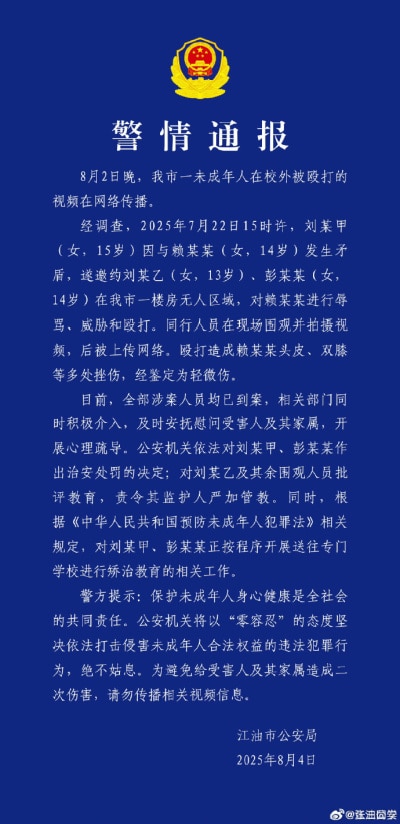
Police report by Jiangyou Public Security Bureau, confirming the details of the incident and the (legal) consequences for the attackers.
Two of the girls (the 15- and 14-year-old) were given administrative penalties and will be sent to a specialized correctional school. The younger Liu and other bystanders were formally reprimanded.
“Parents Speak Out for the Bullied Girl”
The way the incident was handled—not just the relatively late official report, but mostly the perceived lenient punishment—triggered anger online.
Many people who had seen the video responded emotionally and felt that the underage girls should be stripped of their rights to take their exams, and that the bullying incident should forever haunt them in the same way it will undoubtedly haunt their victim.
Especially the phrase “It’s not like I haven’t been taken in [to jail] before” struck a chord, as it showed just how calculated the bullies were—and how, by counting on the leniency of the Chinese judicial system for minors, they made the system complicit in their determination to turn those hours into a living hell for Lai.
China has been dealing with an epidemic of school violence for years. In 2016, Chinese netizens were already urging authorities to address the problem of extreme bullying in schools, partly because minors under the age of 16 rarely face criminal punishment for their actions.
Since 2021, children between the ages of 12 and 14 can be held criminally responsible for extreme and cruel cases resulting in death or disability—but their legal prosecution must first be approved by the Supreme People’s Procuratorate (SPP).
It has not done much to stop the violence.
Discussions around extreme bullying like this have repeatedly flared up over the years, such as in 2020, when a 15-year-old schoolboy named Yuan (袁) in Shaanxi was fatally beaten and buried by a group of minors.
Last year, a young boy named Wang Ziyao (王子耀) was killed by three classmates after suffering years of bullying. His body was found in a greenhouse just 100 meters from the home of one of the suspects, and the case shocked and enraged local residents.
But the problem is widespread among girls, too.
In 2016, we already reported on how so-called ‘campus violence videos’ (校园暴力视频) had become a concerning trend. In these kinds of videos—often showing multiple bullies beating up a single victim on camera—it’s not uncommon to see girls as the aggressors.
Girls often form cliques to gang up on a victim to show that they are in control or to gain popularity. They also tend to be more inclined than boys to make cruel jokes or stage pranks meant to embarrass or humiliate their target. This may partly explain why there seem to be more campus violence videos on Chinese social media showing girls bullying girls than boys bullying boys.
In the case of Lai, she appears to have been particularly vulnerable. One of her relatives posted online that her mother is deaf and mute, and her father allegedly is disabled. This fact may have contributed to why Lai was repeatedly targeted and bullied by the same group of girls, who reportedly took away her phone and socially isolated her at school.
In response to the incident, netizens started posting the hashtag “Parents Speak Up for the Bullied Girl” (“#家长们为被霸凌女孩发声#), not only to support Lai and her family, but to demand harsher punishments for school bullies and for stricter crackdown on this nationwide problem.
From Online Anger to Offline Protest
While many people spoke out for Lai online, hundreds also wanted to show up for her in person.
On August 4, dozens of people gathered in front of the Jiangyou Municipal Government building (江油市人民政府) to demand justice and support Lai’s parents, who had come to express their grievances to the authorities—at one point even bowing to the ground in a plea for justice to be served for their daughter.

Footage and images circulating on social media showing the parents of Lai, the victim, bowing on the ground to demand justice from authorities.
As the crowd grew larger, tensions escalated, eventually leading to clashes between protesters and police.
The arrests at the scene did little to ease the situation. As night fell, the mood grew increasingly grim, and some protesters began throwing objects at the police.
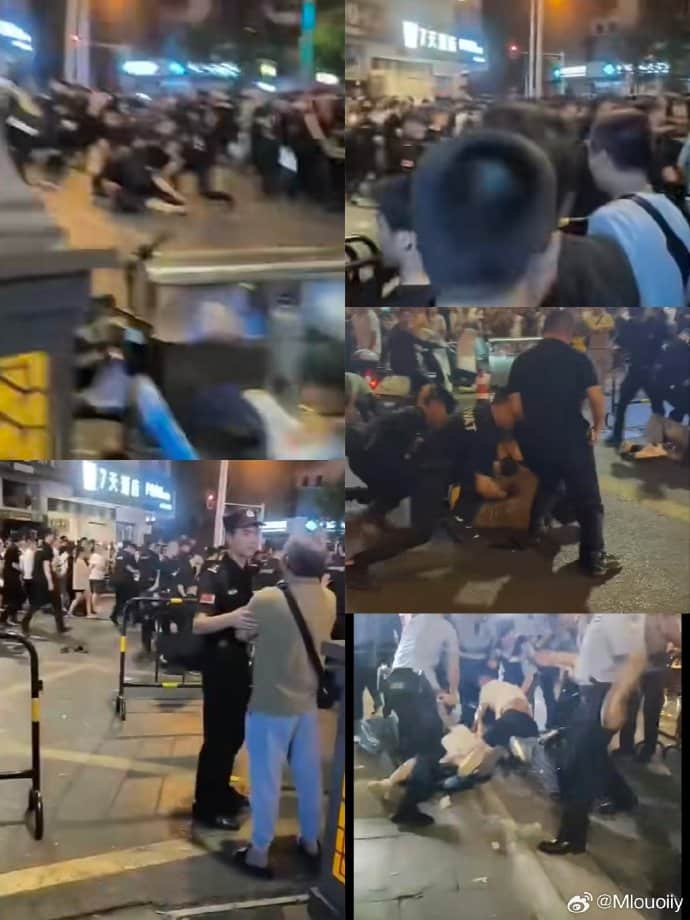
Images of the protest, posted on Weibo.
Near the east section of Shixian Road (诗仙路东段), more people gathered. Hundreds of individuals filming and livestreaming captured footage of the police crackdown—officers beating protesters, dragging them away, and deploying pepper spray.

Netizens’ digital artwork about the bullying incident, the parents’ grievances, and the public protest and its crackdown in Jiangyou. Shared by 程Clarence.
Although the protests briefly gained traction on social media and became a trending topic on Weibo, the search term was soon removed from the platform’s trending list.
Lasting Mental Scars
On Tuesday, August 5, several topics related to the Jiangyou bullying incident began trending again on Chinese social media.
On the short video app Kuaishou, a collective demand for justice surged to the number one spot, under the tag “A large number of Jiangyou parents demand justice for the victim” (江油大批家长为受害学生讨公道).
As of now, none of the perpetrators’ families have come forward to apologize.
As for Lai—according to the latest reports, she did not suffer serious physical injuries from the bullying incident, but according to her own parents, the mental scars will last. She will need continued mental health support and counseling going forward.
Although many posts about the incident and the ensuing protests have been taken offline, ‘Jiangyou’s Bullying Incident’ has already become one more case in the growing list of brutal school bullying incidents that have surfaced on Chinese social media in recent years. The heat of local anger may fade over time, but the rising number of such cases continues to fuel public frustration nationwide—especially if local authorities fail to do more to address and prevent school bullying.
“Not being able to protect our children, that’s a disgrace to our schools and the police,” one commenter wrote: “I want to thank all those mothers who have raised their voices for the bullied child. Each of us must say no to bullies, and we must do all we can to stop them. I hope the lawmakers agree.”
By Manya Koetse
(follow on X, LinkedIn, or Instagram)
Spotted a mistake or want to add something? Please let us know in comments below or email us. First-time commenters, please be patient – we will have to manually approve your comment before it appears.
©2025 Whatsonweibo. All rights reserved. Do not reproduce our content without permission – you can contact us at info@whatsonweibo.com.
China Insight
The Secret Life of Monks: Shi Yongxin’s Shaolin Scandal Casts a Shadow on Monastic Integrity
“To put it bluntly, temples have been places of deception, corruption, opportunism, and exploitation since ancient times.”
Published
3 months agoon
July 28, 2025
This week, news about a well-known Chinese monk going off the Buddhist path has triggered many discussions on Chinese social media.
The story revolves around Shi Yongxin (释永信), the head monk at China’s famous Shaolin Temple (少林寺) in Dengfeng, Henan. Shi is suspected of embezzlement of temple funds and illicit relationships, and is currently under investigation.
In recent days, wild rumors have been circulating online claiming that Shi fled to the United States after being exposed. On July 26, a supposed “police bulletin” began circulating, alleging that Shi Yongxin had attempted to leave the country with seven lovers, 21 children, and six temple staff. It also claimed he was stopped by authorities before exiting China, that he had secretly obtained U.S. citizenship a decade ago, and that he had misused donations and assumed fake identities.
Although that specific report has since been refuted by Chinese official media, it quickly became clear that there was real fire behind all that smoke.

The report that circulated online and was later confirmed to be fake
Because despite all the sensationalized gossip (some posts even claimed Shi had 174 illegitimate children!), what’s certain is that Shi Yongxin seriously crossed the line. On July 27, 2025, the Shaolin Temple Management Office (少林寺管理处) issued an official statement through its verified channels, including its WeChat account. The statement read:
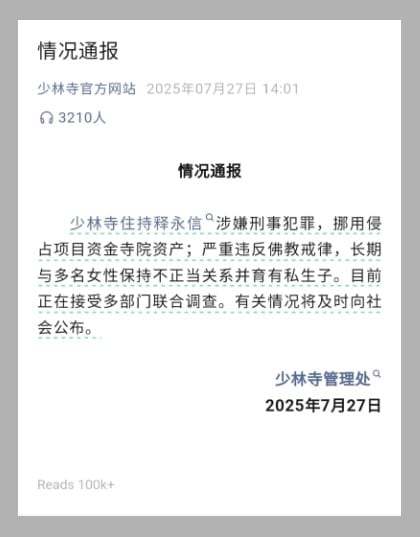
The report that circulated online and was later confirmed to be fake.
Shi Yongxin, the Abbot of Shaolin Temple, is suspected of criminal offenses, including misappropriating and taking project funds and temple assets. He seriously violated Buddhist discipline, maintained improper relationships with multiple women over a long period and fathered illegitimate children. He is currently under joint investigation by multiple departments. Relevant information will be made public in due course.
Shaolin Temple Management Office
July 27, 2025
China’s Buddhist Association (中国佛教协会) also released a statement on July 28, in which it stated that, in coordination with the Henan Provincial Buddhist Association (河南省佛教协会), Shi Yongxin has been officially stripped of his monastic status.
Various Chinese media sources report that Shi Yongxin was taken away by police on Friday, July 25. Chinese media outlet Caixin suggests that it must not have come as a complete surprise, since Shi had allegedly already been restricted from leaving the country since around the Spring Festival period (late January 2025) (#释永信春节前后已被限制出境#).
About Shi Yongxin
Shi Yongxin is not just any abbot. He’s the abbot of the Shaolin Monastery (少林寺), which is one of the most famous Buddhist temples in the world and is known as the birthplace of Shaolin Kung Fu. The temple was founded in 495 CE. Besides being a Buddhist monastery, it also operates as a popular tourist attraction, a kung fu school, and a cultural brand.
Shi has been running the monastery for 38 years, a fact that also went trending on Weibo these days (#释永信已全面主持少林寺38年#, 140 million views by Monday).
Shi Yongxin is the monastic name of Liu Yingcheng (刘应成), born in Yinshang county in Fuyang, Anhui, in 1965. He came to Shaolin Temple in 1981 and became a disciple of abbot Shi Xingzheng (释行正), who passed away in 1987. Shi Yongxin then followed in his footsteps and managed the temple affairs. He formally became head monk in 1999.
Moreover, Shi Yongxin reportedly served as President of the Henan Provincial Buddhist Association since 1998 and as Vice President of the Buddhist Association of China since 2002.

Shi Yongxin, photos via Weibo.
Shi Yongxin was thus an incredibly powerful figure—not only because of the decades he spent overseeing temple affairs, but also due to his influence within public, institutional, and religious spheres.
Holding such a visible role, Shi Yongxin (释永信) also had (or has—though it’s unlikely he’ll ever post again) a Weibo account with over 882,000 followers (@释永信师父). His last post, made on July 24, was a Buddhist text about the ‘Pure Land’ (净土)—a realm said to make the path toward enlightenment easier.
That post has since attracted hundreds of replies. While some devoted followers express disbelief over the scandal, many others respond with cynicism, questioning whether anything about Buddhism remains truly ‘pure.’
One widely shared post shows an artist sitting in front of a painting of Shi Yongxin, writing, “Worked on this painting for six months, just finished late last night—feels like the sky’s collapsed.” The second picture, posted by someone else, says, “Just change it a bit.”

One aspect of the scandal fueling online discussions is the fact that Shi Yongxin had led the monastery for so long. Rumors about his “chaotic private life” and unethical behavior surfaced years ago, going back to at least 2015 (#释永信10年前就曾被举报私生活混乱#; #释永信曾被举报向弟子索要供养钱#). One of the questions now echoing across social media is: why wasn’t he held accountable sooner? “Who was protecting him?”
“The Tip of the Iceberg”
The Shi Yongxin scandal does not just hurt the reputation and cultural brand of the Shaolin Monastery; it also damages a certain image of Buddhist monks as a collective of people with true faith and integrity.
According to well-known knowledge blogger Pingyuan Gongzi Zhao Sheng (@平原公子赵胜), many people’s understanding of abbots or Buddhist masters (“方丈大师们”) is flawed, since it’s generally believed they attained their high positions within the monasteries due to their moral virtue or deep understanding of Buddhism. In reality, Zhao Sheng argues, these individuals often rise to power because they are skilled at earning money and gaining influence.
“To put it bluntly,” Zhao Sheng writes, “temples have been places of deception, corruption, opportunism, and exploitation since ancient times.”
The blogger argues that much of the influence and power of Buddhist masters was stripped away under Mao Zedong, but that some new famous monks rose in the 1980s, using their skills and connections to rebuild temples and turn them into thriving enterprises.
“If you want to find a few people in temples who truly have faith, who truly have personal integrity, and who are truly dedicated to saving all living things, it’s not that they don’t exist—but it’s rather difficult, like finding a needle in a haystack,” Zhao Sheng wrote.
Some commenters suggest that Shi Yongxin is just the tip of the iceberg (“冰山一角”). They believe that if someone as influential as him can be involved in such misconduct—despite whistleblowers having tried to expose him for over a decade—there must be many more cases of power abuse and corruption within China’s monasteries.
“I previously donated money to the temple,” one commenter on Xiaohongshu wrote: “Although it wasn’t much, it does make me a bit uncomfortable now.”
Another person posted that the Shi Yongxin scandal gave them a sense of despair.
Some older posts about the extravagant lifestyles of head monks — including their luxury cars — have also resurfaced online and are once again making the rounds, suggesting that netizens are actively revisiting other potential instances of misconduct within the monastic world.

Abbot Guangquan Fashi (光泉法师) with a Ferrari California T, Kaihao Fashi (开豪法师) with a Porsche Panamera, Shi Yongxin (释永信) linked to an Audi Q7, and Huiqing (慧庆) and a BMW 7 Series.
One image that resurfaced online shows Shi Yongxin—allegedly driving an Audi Q7—alongside other abbots, such as Guangquan Fashi (光泉法师), the head monk of Lingyin Temple (灵隐寺), who is associated with a Ferrari.
More images like these are now circulating, as people delve into the ‘secret lives of monks’ beyond the spiritual, shifting focus to their material lives instead.

Monks from major temples, including Qin Shangshi (钦尚师) of Famen Temple, E’erdeni (鄂尔德尼) of Jokhang Temple in Lhasa, Yin Le (印乐) of Baima Temple, and Huiqing (慧庆) of Baishou Temple, are rumored to be associated with high-end cars like BMWs, a Porsche Cayenne, and a Range Rover.
While the results of the investigation into Shi Yongxin are still pending, many netizens are already looking beyond him. One person writes: “Are you realizing now? It’s not just Shaolin Temple that has money, other temples aren’t exactly short on money either.”
Another person wonders: “Are the monks in today’s temples actually still truly devoted to spiritual practice at all?”
By Manya Koetse
(follow on X, LinkedIn, or Instagram)
Spotted a mistake or want to add something? Please let us know in comments below or email us. First-time commenters, please be patient – we will have to manually approve your comment before it appears.
©2025 Whatsonweibo. All rights reserved. Do not reproduce our content without permission – you can contact us at info@whatsonweibo.com.
Subscribe
What’s on Weibo is a reader-supported publication, run by Manya Koetse (@manyapan), offering independent analysis of social trends in China for over a decade. To receive new posts and support our work, consider becoming a paid subscriber.

Get in touch
Would you like to become a contributor, or do you have any tips or suggestions? Get in touch here!

How the “Nexperia Incident” Became a Mirror of China–Europe Tensions

China Faces Unprecedented Donkey Shortage Crisis

Nanchang Crowd Confuses Fan for Knife — Man Kicked Down and Taken Away

The Wong Kar-wai Scandal Explained: The Dark Side of ‘Blossoms Shanghai’

China’s National Day Holiday Hit: Jingdezhen’s “Chicken Chop Bro”

Hidden Cameras and Taboo Topics: The Many Layers of the “Nanjing Sister Hong” Scandal

“Jiangyou Bullying Incident”: From Online Outrage to Offline Protest

The Rising Online Movement for Smoke-Free Public Spaces in China

China Trend Watch: Pagoda Fruit Backlash, Tiananmen Parade Drill & Alipay Outage (Aug 11–12)

From Schadenfreude to Sympathy: Chinese Online Reactions to Charlie Kirk Shooting
Popular Reads
-

 China Memes & Viral3 months ago
China Memes & Viral3 months agoHidden Cameras and Taboo Topics: The Many Layers of the “Nanjing Sister Hong” Scandal
-

 China Books & Literature12 months ago
China Books & Literature12 months agoThe Price of Writing Smut: Inside China’s Crackdown on Erotic Fiction
-

 China Insight5 months ago
China Insight5 months agoUnderstanding the Dr. Xiao Medical Scandal
-

 China Memes & Viral10 months ago
China Memes & Viral10 months agoOur Picks: Top 10 Chinese Buzzwords and Phrases of 2024 Explained

